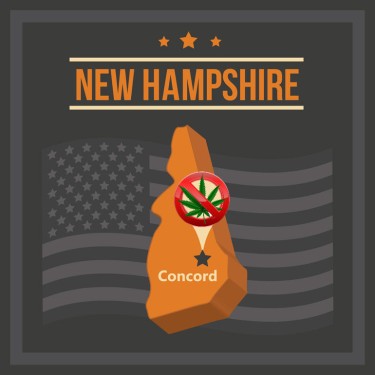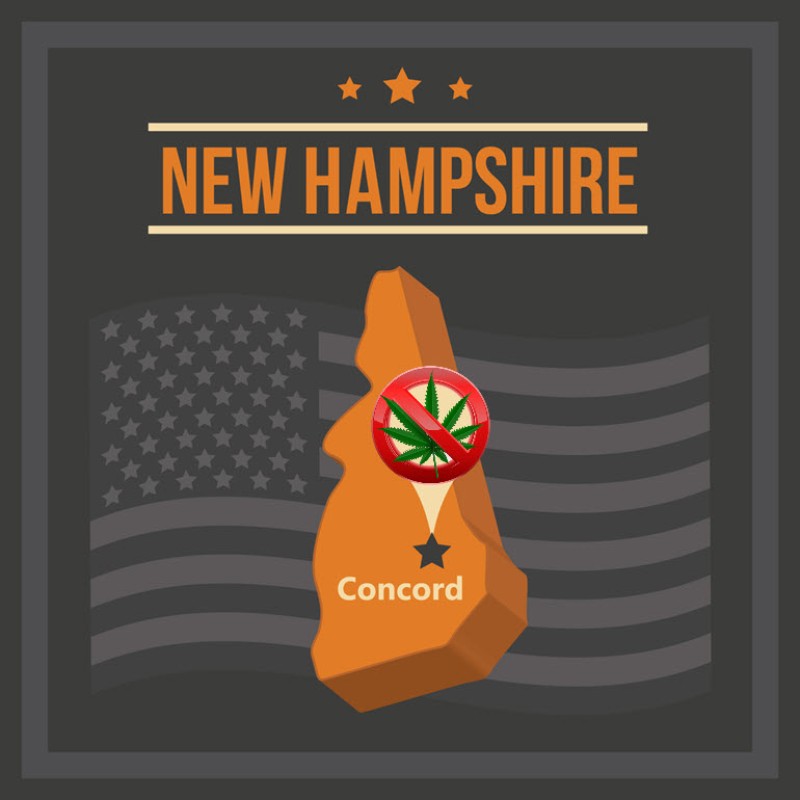
Two bills that aimed to legalize marijuana in New Hampshire, along with a proposal to permit medical cannabis patients to cultivate their plants, have been turned down by a Senate committee. However, despite the setback in the procedural phase, the bills are still slated to proceed to the floor.
The Republican sponsor of marijuana legalization indicated that he is ready to obstruct Senate bills unrelated to the issue if the upper chamber fails to pass the proposed reform.
The Senate Judiciary Committee voted 3-2 to reject the legalization and regulation proposal put forward by Minority Leader Matthew Wilhelm (D) and House Majority Leader Jason Osborne (R), citing it as "inexpedient to legislate" (ITL). Similar decisions were also made for a non-commercial legalization bill and a proposal allowing home cultivation for cannabis patients.
Last month, the panel held a hearing on the proposals, coinciding with the cannabis holiday on 4/20.
Senator Rebecca Whitley (D) opposed the ITL motion for the comprehensive legalization bill. She stated that her constituents have been unambiguous in their call to end marijuana prohibition in New Hampshire and to legalize it in a regulated manner.
She expressed that New Hampshire is an island of prohibition, resulting in money being spent outside the state's borders. The proposed bill presented an opportunity to retain those funds. She believes that rejecting this bill is a mistake," she said. She expected that we would have a chance to discuss it."
A Close Eye on Legislation
Advocates have been closely monitoring the legislation to keep hope alive, hoping the GOP-controlled Senate would support the report. This is after the GOP-controlled Senate had previously rejected two legislation proposals approved in the House. The failed bill is technically not dead, and advocates are pushing for a re-debate on the floor. Although some senators believe the chances of success are relatively low.
Osborne, who sponsored the bill and is the House majority leader, warned the Senate. He urged them to stop procrastinating. He clarified that numerous Senate bills are currently in the House's possession and suggested that it would be regrettable if anything occurred to them.
Senate President Jeb Bradley (R) has already declared his opposition to the legislation and anticipated that it would not succeed on the floor. The commercial legalization bill, which came to a standstill in the committee, has a different model than the previous House-approved measures. It recommends a more traditional, regulated private market, differing from the non-commercial and state-run bills that did not pass in the last session.
Advocates are more optimistic, given the recent changes in Senate membership after last year's election. They think they can tilt the scale by convincing new members. Senator Keith Murphy (R), who co-sponsored the reform bill, believed the measure had a 50-50 chance of being approved this session. Last month, HB 639, the bill in question, was passed by the House with over two-thirds of the votes.
What HB 639 Would Accomplish
-
Individuals 21 or older would have the authority to buy, own, and give away as a gift up to four ounces of cannabis.
-
The Liquor and Cannabis Commission, which has been renamed, would be in charge of regulating the cannabis industry and issuing commercial licenses.
-
There would be no statewide limit on the number of licensed cannabis businesses.
-
The state's Department of Health and Human Services (DHHS) and the commission would be required to establish regulations within 18 months of the legislation's enactment. They will permit medical marijuana dispensaries to apply for dual licenses to serve both medical patients and adult consumers.
-
At the wholesale level, cannabis would be subject to a tax of 12.5% based on the final value of the products.
-
Once the expenses related to legalizing cannabis have been covered, $100,000 of the revenue would be allocated to collect data and report on the health effects of cannabis regulation and prohibition.
-
The remaining funds from the proposed legislation would be allocated as follows: 50% would be provided to cities and towns to offset the education tax, 30% would be applied to the New Hampshire retirement system to offset its unfunded accrued liability, and 10% or $25 million would be allocated for substance use programs. A further 5% of the funds would be designated for the hiring and training of drug recognition experts, and 5% would be allotted to support children's behavioral health services.
-
Municipalities would have the authority to restrict or prohibit the operation of cannabis enterprises within their jurisdiction.
-
Employees of local or state governments would not be penalized for smoking marijuana outside of work and would enjoy job rights. Furthermore, the sole justification for denying or revoking professional and occupational licenses could not be cannabis use.
-
Marijuana businesses would be allowed to deduct their business expenses from state taxes.
-
The proposed legislation does not include any provisions for home cultivation or the expungement of prior cannabis convictions.
In addition, the committee declined the proposed legislation that would have granted medical marijuana patients the right to grow their plants for personal use. The bill aimed to enable patients and their designated caregivers to cultivate a maximum of three immature and mature plants and 12 seedlings. On Tuesday, a bill that passed the House with minimal restrictions and regulations on cannabis legalization was also considered Inexpedient to Legislate (ITL).
Gov. Chris Sununu (R), re-elected last year, continues to oppose legalization, despite recent comments that indicate a change in his views. He said that reform "could be inevitable" but highlighted the need for caution during last year's debate.
Last year, the House sought to add legalizing wording as an amendment to separate criminal justice-related legislation, but the Senate rejected both bills. However, the amendment was ultimately struck down by the opposite chamber.
Conclusion
Cannabis legalization in New Hampshire has been challenging, with supporters facing several challenges. So far, reform bills have been rejected by the opposition from Governor Chris Sununu and the Senate. Nonetheless, the House recently approved the commercial legalization bill, which has reignited hope for cannabis advocates. This bill could be more of a traditional and regulated private market model that could garner more support with time.
The next battle for the commercial legalization bill is with the Senate. The atmosphere around the bill is positive, with some Senate members expressing optimism about it being passed. If the bill is approved, individuals 21 years and above can buy and possess a maximum of 4 ounces of cannabis. The bill would also allow for the establishment of a regulatory body that will oversee the cannabis market. Presently, how the politics will play out is still unclear, but New Hampshire could join the long list of cannabis-legalized states.






